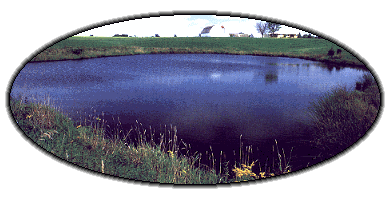When most people use the word pondering, they mean
that they're thinking about something. Well, when
I use the word pondering, I'm usually thinking about
something, too. Usually I'm thinking about fishing.
Fishing ponds, to be exact. There is a wealth of
ponds in my part of the country, some on private
property, some on public lands, some natural, some
manmade. Some were made as a byproduct of another
enterprise, such as a rock quarry. Some are formed
when a river or stream overflows. I include old
oxbow lakes in my definition of ponds, although
some folks don't.
Ponds are often my salvation during the early
spring, because of the fact that they warm up
more quickly than streams or lakes, and the fish
start biting weeks earlier than in lakes or streams.
This area usually has a brief warm spell during
February or early March, and given three days of
sunshine during this period, I can usually catch
my largest bass of the year.
Look for a pond with the tailout, or shallow end,
on the north side. Given the angle of the sun at
this time of year, the north end receives more
sunlight and warms quicker. Being shallow, it
usually warms a lot quicker. On the third day
of a warm spell, probably 95% of the fish in
the pond will be congregated in the shallows
on the north end. And they will be hungry!
One pond that I have fished often for the past
15 years has a cut on the north side where the
bulldozer moved in and out of the pond as it
worked. During these brief warm days, every bass
in the pond will move into this cut. It makes for
some fantastic fishing! At this time of year the
fish are not particular, if the fly resembles
something edible, it gets eaten!
On another positive note, ponds are often overlooked
by the mainstream of anglers. One pond inside city
limits, on city property, has yielded several bass
in the 6 to 8 pound range in the past few years. This
pond is no more than an acre in size, and sits directly
beside a busy city street. The street department even
keeps the bank mowed on one side. I've seldom seen anyone
else fishing it. However, when I do catch a nice fish, I
keep it hidden! When catching small bluegills, I make a
great production of unhooking them! I'd hate for one of
the local bass fishermen to see me take one of those 7
or 8 pounders out of the water!

Some of the ponds I fish are probably unknown to
anyone except the owners. Far from the nearest road,
hidden in a fold of land, or tucked away behind a hill,
they can only be seen if you stumble across them, or
fly over them. These are some of my most prized waters.
I can always depend on finding peace and quiet on these
ponds, and they are where I go when I need to recharge
my batteries. The local streams and lakes all offer good
fishing, but sometimes offer more companionship than I want.
Ponds also offer some unexpected catches. I was fishing
during an early spring day on a small pond when something
charged my deer hair bass bug from a distance of at least
50 feet. I would not have thought the little bug was even
visible from that distance, but the fish slammed it with
murder on it's mind! After quite a battle on the little
5 wt., I landed a seven-pound buffalo. These fish are
normally bottom feeders. I still don't know why it killed
that little deer hair bug.
The only fish that has ever ruined a reel for me
came from a pond. It was a 12 ½ pound channel cat
caught on the same little 5 wt. I was using a homemade
shooting head with flat mono running line. The fish's
first run took more than 100 yards of running line. As
I pumped the fish back, and it made several shorter runs,
the stretch in the mono running line spread the spool of
my reel until it split. Luckily, the fish was exhausted
by this time, and I was able to slide it up into shallow
water. The reel was retired. I no longer use mono for
running line or backing. I will always spool up something
with little or no stretch.
Fish are often found in ponds when they aren't supposed
to be there. It's usually assumed that smallmouths, spotted
bass and walleyes cannot survive in ponds in this area,
because of the high water temperatures during the summer.
I can show you ponds that have good populations of each
of these species, with some large fish present. This would
indicate to me that the fish have been present and doing
well for quite some time.
When ponds are fished heavily, usually only one or two
species are targeted. If a pond is fished for crappies,
the bluegills are often ignored. If catfish are the
usual quarry, try the bass. The quality of fishing right
around the corner from your home can be amazing. I can
be fishing for several species less than ten minutes
form my door. Hmmmmm, maybe this explains why I don't
consider myself a trout fisherman, I have to drive about
45 minutes to fish for those ………
~ Ron Griffith
|



